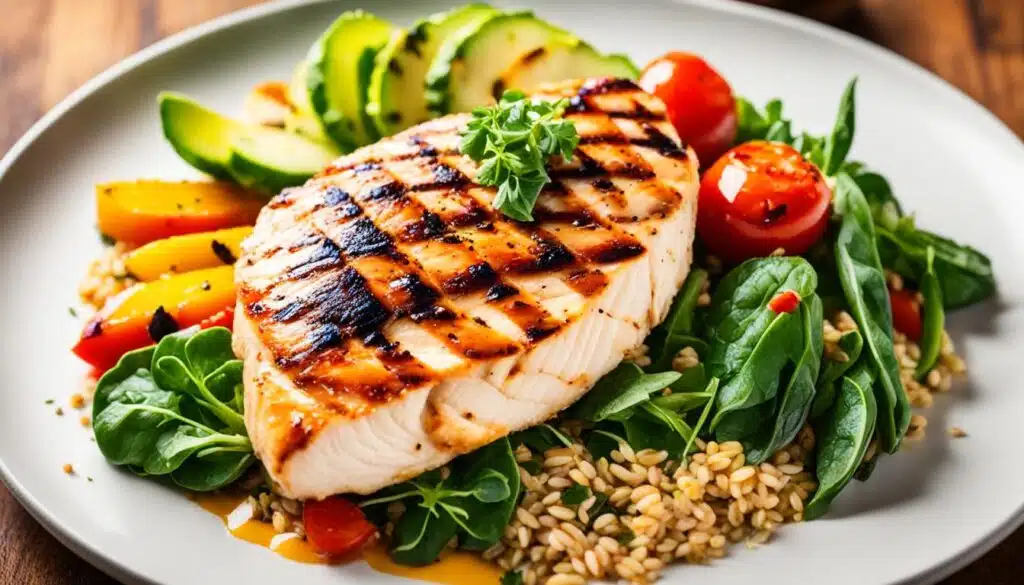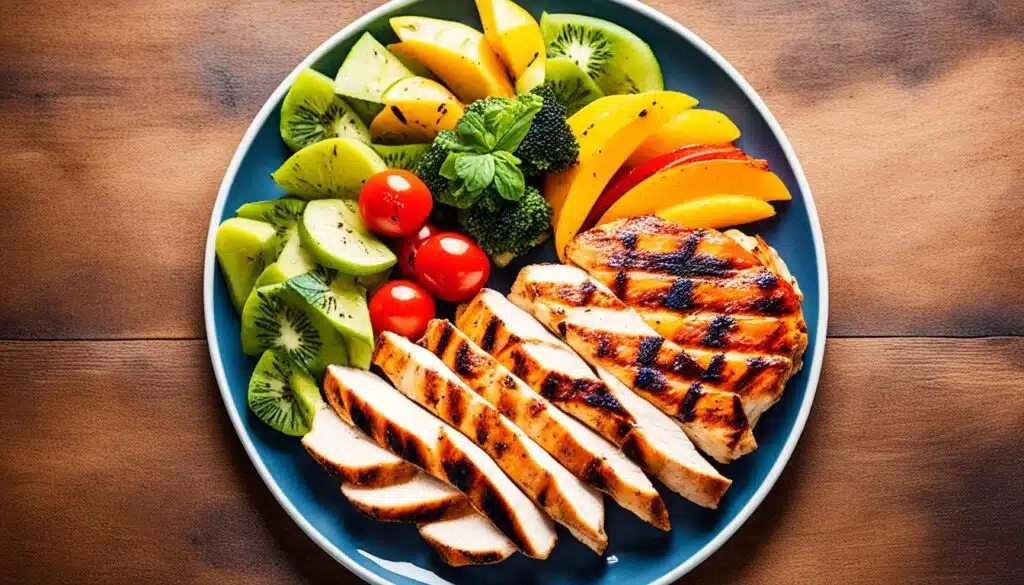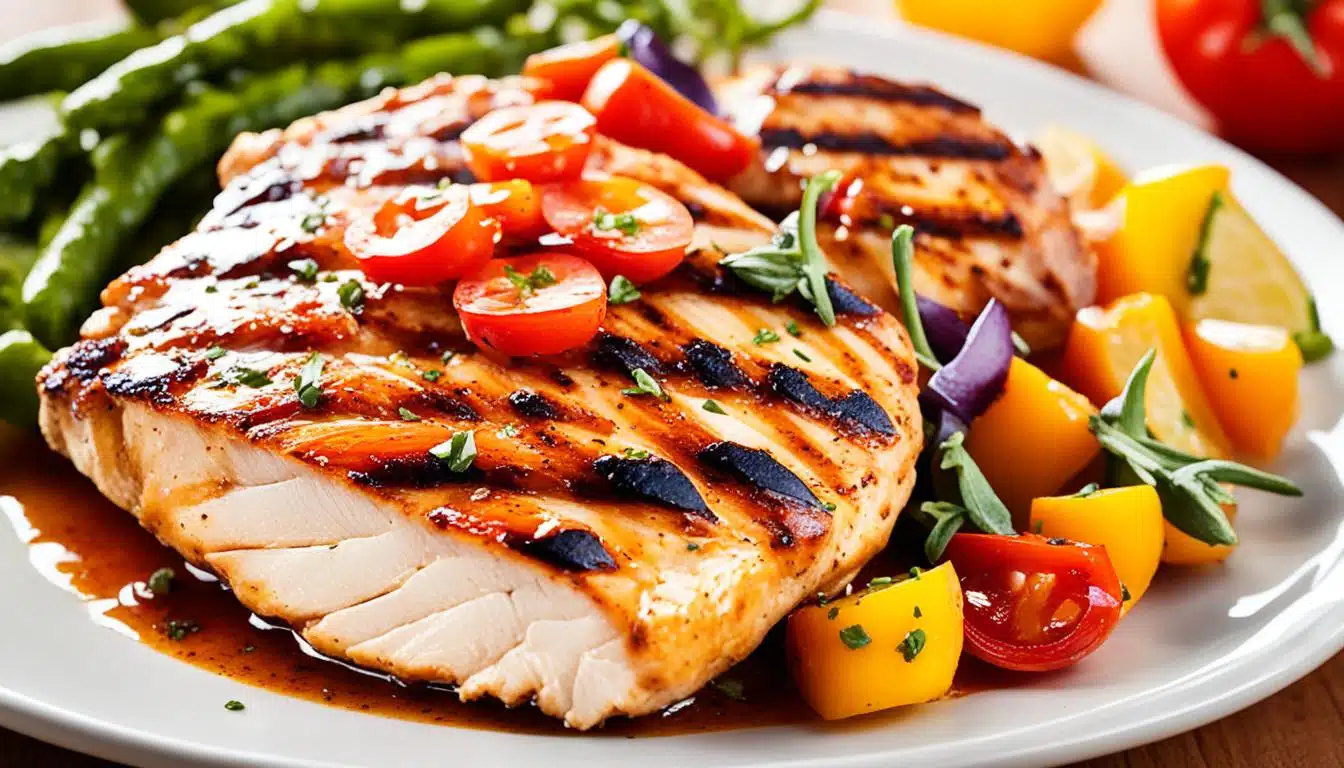When it comes to building a healthy and balanced diet, it’s important to incorporate a variety of nutrient-rich foods. One such food that deserves a place on your plate is grilled chicken breast nutrition. Not only is it a delicious and versatile protein source, but it also offers a host of nutritional benefits that can fuel your body and support your overall well-being.
Grilled chicken breast nutrition is a lean protein powerhouse. It is low in fat and high in protein, making it an ideal choice for those looking to maintain a healthy weight or build lean muscle. Protein is an essential nutrient that plays a crucial role in various bodily functions, such as repairing tissues, building enzymes and hormones, and supporting a strong immune system.
In addition to being a protein source, grilled chicken breast is also rich in other important nutrients. It is packed with vitamins and minerals like vitamin B6, vitamin D, iron, and zinc. These nutrients are essential for maintaining optimal health, promoting healthy growth and development, and supporting a strong immune system.
By incorporating grilled chicken breast into your diet, you can enjoy the benefits of a balanced meal. Pair it with a variety of vegetables and whole grains for a well-rounded plate that provides all the essential nutrients your body needs.
Key Takeaways:
- Grilled chicken breast is a lean protein source that can support weight management and muscle growth.
- It is rich in essential nutrients like vitamin B6, vitamin D, iron, and zinc.
- Incorporating grilled chicken breast into a balanced diet can help provide the necessary nutrients for overall health.
- Pairing grilled chicken breast with vegetables and whole grains creates a well-rounded and nutritious meal.
- Consider grilling chicken breast with flavorful marinades and seasonings to enhance its taste without adding excessive fat or calories.
Key Nutritional Facts of Grilled Chicken Breast
When it comes to healthy and nutritious food options, grilled chicken breast often takes center stage. Packed with essential nutrients and low in fat, it has become a popular choice for those looking to fuel their bodies while maintaining a balanced diet.
Let’s dive into the key nutritional facts of grilled chicken breast:
Calories
Grilled chicken breast is a calorie-conscious choice, making it suitable for various dietary needs. On average, a 3-ounce serving of grilled chicken breast contains approximately 165 calories, making it an excellent option for those watching their calorie intake.
Fat Content
When it comes to fat, grilled chicken breast is a lean choice. A 3-ounce serving typically contains around 3 grams of fat. Compared to other meats, grilled chicken breast is notably lower in saturated fats, which is beneficial for supporting heart health.
Protein Powerhouse
Grilled chicken breast is an exceptional source of protein. A 3-ounce serving contains about 26 grams of protein, providing the body with the building blocks it needs for muscle development and repair. Protein is also known for its satiating effect, making grilled chicken breast a satisfying choice for those looking to manage their weight.
With its low-fat and high-protein profile, grilled chicken breast is a versatile and nutritious option for a well-rounded diet. Incorporating it into your meals can help you meet your protein needs while keeping your calorie and fat intake in check.
Next, we’ll explore the various health benefits of consuming grilled chicken breast as part of a balanced diet. Stay tuned!
Protein Power: The Health Benefits of Grilled Chicken Breast
Grilled chicken breast is not only a delicious and versatile food, but it also offers a wide range of health benefits. As a lean protein source, it plays a crucial role in supporting muscle growth, aiding in weight management, and contributing to overall health and wellness.
Health benefits: Grilled chicken breast is packed with essential nutrients that promote a healthy body. It is a rich source of lean protein, which is vital for muscle repair, growth, and maintenance. Protein helps to build and strengthen tissues, boost metabolism, and regulate hormone production. By incorporating grilled chicken breast into your diet, you can ensure that your body receives the protein it needs to thrive.
Muscle growth: Protein is essential for building and repairing muscles. Regular consumption of grilled chicken breast provides the amino acids necessary for muscle growth and recovery, making it an ideal choice for athletes, fitness enthusiasts, and anyone looking to increase their muscle mass.
Aid in weight management: Grilled chicken breast is a nutritious and low-calorie option that can support weight management efforts. Its high protein content helps to increase satiety and reduce hunger cravings, making it easier to maintain a calorie deficit for weight loss. Additionally, the lean nature of grilled chicken breast means that it is low in fat, making it a healthier alternative to other protein sources.
Contribution to overall health and wellness: Grilled chicken breast is not only a protein powerhouse but also contains essential vitamins and minerals. It is a good source of B vitamins, such as niacin and vitamin B6, which help support brain function, energy production, and a healthy immune system. Additionally, it provides minerals like phosphorus and selenium, which play vital roles in bone health and antioxidant defense, respectively.
To fully understand the nutritional value of grilled chicken breast, let’s take a look at the following table:
| Nutrient | Per 100g |
|---|---|
| Calories | 165 |
| Protein | 31g |
| Total Fat | 3.6g |
| Saturated Fat | 1.0g |
| Cholesterol | 85mg |
| Sodium | 76mg |
| Potassium | 301mg |
Grilled chicken breast is a nutritious and delicious addition to a well-balanced diet. Its protein power, along with its various health benefits, makes it an excellent choice for individuals seeking to enhance their overall health and wellness.

Getting the Most Out of Grilled Chicken Breast Nutrition
When it comes to maximizing the nutritional benefits of grilled chicken breast, portion control plays a crucial role. Understanding the proper serving size and its contribution to daily nutrient intake is essential for maintaining a healthy lifestyle.
Serving size is the recommended amount of food to consume in one sitting. For grilled chicken breast, a typical serving size is around 3 ounces, which is about the size of a deck of cards or the palm of your hand. By adhering to the appropriate serving size, you can ensure that you are getting the right amount of essential nutrients without overindulging.
Controlling portion size not only helps manage calorie intake but also allows you to balance your nutrient intake effectively. Grilled chicken breast is a good source of protein, with approximately 25 grams per 3-ounce serving. Protein is essential for muscle growth, repairing tissues, and supporting overall health.
Furthermore, by understanding the daily value of nutrients, you can make informed decisions about your eating habits. The daily value represents the amount of a specific nutrient that an average adult requires in a day based on a 2,000-calorie diet. Grilled chicken breast contributes to several daily values, including protein, iron, and vitamin B-6.
Pro Tip: Experiment with flavor profiles by marinating your grilled chicken breast in herbs, spices, and citrus juices. This will enhance taste without compromising its nutritional value.
Below is a table that illustrates the serving size, calorie content, and nutrient composition of a 3-ounce serving of grilled chicken breast:
| Nutrient | Amount per Serving |
|---|---|
| Calories | 165 |
| Total Fat | 3 grams |
| Saturated Fat | 1 gram |
| Protein | 25 grams |
| Iron | 1% of the daily value |
| Vitamin B-6 | 7% of the daily value |
By keeping portion size in check and being mindful of nutrient intake, you can make the most out of the grilled chicken breast nutrition. Incorporating this lean protein source into your diet can help you achieve your health and fitness goals while enjoying a delicious and satisfying meal.
Grilling Tips for Healthy and Flavorful Chicken Breasts
Grilling chicken breasts is an excellent way to enjoy a delicious and nutritious meal. Not only does grilling enhance the natural flavors of the meat, but it also allows for healthier cooking methods that help retain essential nutrients. Follow these grilling tips to create mouthwatering and health-conscious chicken dishes:
1. Marinate for Maximum Flavor
Marinating chicken breasts before grilling can add an explosion of flavor to your dish. Choose marinades that are low in sodium and sugar, and rich in herbs, spices, and citrus juices for a healthy and tasty option. Allow the chicken to marinate for at least 30 minutes to tenderize the meat and infuse it with delicious flavors.
2. Opt for Lean Cuts
Selecting lean cuts of chicken breasts is essential for a healthy grilled meal. Removing excess fat and skin reduces the overall calorie and fat content. Skinless chicken breasts are a great choice as they offer a lean protein source without compromising flavor. A boneless, skinless chicken breast has approximately 165 calories, 3.6 grams of fat, and 31 grams of protein per 100 grams serving size.
3. Season with Herbs and Spices
Elevate the taste of your grilled chicken breasts by using a variety of herbs and spices. Not only do they add depth and aroma to the meat, but they also provide health benefits. Sprinkle a blend of herbs like rosemary, thyme, and oregano or spices such as paprika and cumin to enhance the flavor profile. Experiment with different combinations to find your favorite.
4. Proper Cooking Temperatures
Cooking chicken breasts to the correct temperature ensures they are safe to eat while retaining their juiciness. The recommended internal temperature is 165°F (74°C) according to the Food Safety and Inspection Service (FSIS). Use a meat thermometer to accurately measure the temperature and avoid overcooking or undercooking the chicken.
5. Grilling Time and Technique
Grilling time for chicken breasts depends on their thickness. Cook boneless, skinless chicken breasts for around 6 to 8 minutes per side over medium heat. Avoid high heat to prevent dryness and uneven cooking. Flip the chicken breasts only once to achieve an evenly cooked interior and a nicely charred exterior.
| Grilling Tips at a Glance |
|---|
| 1. Marinate the chicken for maximum flavor. |
| 2. Choose lean cuts like skinless chicken breasts. |
| 3. Season with herbs and spices for added taste. |
| 4. Ensure the chicken reaches an internal temperature of 165°F (74°C). |
| 5. Grill the chicken over medium heat for 6 to 8 minutes per side. |

Grilling chicken breasts using these tips will result in healthy, flavorful, and juicy meals that are sure to impress your family and friends. Experiment with different seasonings and marinades to create a variety of delectable dishes. So fire up the grill and enjoy the goodness of grilled chicken breasts!
Incorporating Grilled Chicken Breast into a Balanced Diet
Grilled chicken breast is not only a delicious protein source but also a versatile ingredient that can be easily incorporated into a balanced diet. Whether you’re looking for meal ideas or recipes, this lean and nutritious option can provide the foundation for a well-rounded and healthy eating plan.
Why include grilled chicken breast in a balanced diet?
When striving for a balanced diet, it’s important to include a variety of nutrients to support overall health and well-being. Grilled chicken breast offers several benefits that make it an excellent addition to your meals:
- High Protein: Grilled chicken breast is a great source of lean protein, which is essential for muscle growth and repair.
- Low Fat: It is naturally low in fat, making it a healthier choice compared to other protein options.
- Vitamins and Minerals: Grilled chicken breast contains essential vitamins and minerals, such as vitamin B-6, vitamin B-12, and zinc.
Aside from its nutritional value, grilled chicken breast is incredibly versatile, allowing you to explore various meal options and recipes. You can easily incorporate it into salads, sandwiches, stir-fries, and more.
“Grilled chicken breast is a versatile ingredient that can be used in a myriad of recipes. Its mild flavor pairs well with a wide range of spices and seasonings, allowing you to experiment and create delicious meals.”
Meal Ideas and Recipes
Here are a few meal ideas and recipes to help you incorporate grilled chicken breast into your balanced diet:
- Grilled Chicken Caesar Salad: Toss grilled chicken breast with fresh romaine lettuce, Parmesan cheese, and a light Caesar dressing for a satisfying and nutritious salad.
- Grilled Chicken and Vegetable Stir-Fry: Sauté grilled chicken breast with a colorful medley of vegetables like bell peppers, broccoli, and snap peas. Season with soy sauce and serve over brown rice or quinoa.
- Grilled Chicken Wrap: Fill a whole wheat tortilla with sliced grilled chicken breast, mixed greens, tomatoes, cucumbers, and your favorite dressing for a quick and healthy lunch option.
- Grilled Chicken and Quinoa Bowl: Create a nourishing bowl by combining grilled chicken breast, cooked quinoa, steamed vegetables, and a drizzle of olive oil or a squeeze of lemon juice.
These meal ideas provide a balance of protein, fiber, and nutrients, ensuring you stay satisfied and nourished throughout the day.

Remember, a balanced diet is all about variety, so feel free to experiment with different flavors, ingredients, and cooking methods to keep your meals exciting and enjoyable. Grilled chicken breast can be your go-to protein source when looking to create nutritious and flavorful dishes.
| Benefits of Incorporating Grilled Chicken Breast | Meal Idea/Recipe |
|---|---|
| High protein content for muscle growth and repair | Grilled Chicken Caesar Salad |
| Low in fat, making it a healthier protein option | Grilled Chicken and Vegetable Stir-Fry |
| Rich in essential vitamins and minerals | Grilled Chicken Wrap |
| Versatile ingredient for a wide range of recipes | Grilled Chicken and Quinoa Bowl |
Grilled Chicken Breast and Weight Loss
When it comes to weight loss, finding the right balance of low-calorie, low-fat, and high-protein foods is essential. Grilled chicken breast fits the bill perfectly, making it a valuable addition to any weight loss meal plan.
Low in calories and fat, grilled chicken breast allows you to satisfy your hunger without consuming excessive calories. A 3-ounce serving of skinless, boneless grilled chicken breast contains only about 165 calories and 3 grams of fat. This means you can enjoy a satisfying meal without sacrificing your weight loss goals.
But it’s not just about the calorie content. Grilled chicken breast is also packed with high-quality protein, which plays a crucial role in weight loss. Protein has a thermogenic effect, meaning it requires more energy to digest and absorb compared to fats and carbs. This boosts your metabolism and helps you burn more calories throughout the day. Additionally, protein is highly satiating, keeping you fuller for longer and reducing the chances of overeating.
Meal prepping with grilled chicken breast can be a game-changer for weight loss success. By preparing and portioning your meals in advance, you have better control over your calorie intake and can ensure you have nutritious and balanced options readily available. Whether you include grilled chicken breast in salads, wraps, or alongside vegetables, it serves as a versatile and reliable protein source to support your weight loss journey.

By incorporating grilled chicken breast into your weight loss plan, you can enjoy a satisfying, flavorful, and nutritious meal while working towards your goals. Remember, it’s not just about cutting calories, but also nourishing your body with the right nutrients to support overall health and well-being.
Nutritional Comparison of Different Cooking Methods for Chicken Breast
| Cooking Method | Calories | Fat (g) | Protein (g) |
|---|---|---|---|
| Grilled | 165 | 3 | 31 |
| Baked | 165 | 3 | 32 |
| Pan-Fried | 197 | 8 | 29 |
| Breaded and Fried | 257 | 12 | 24 |
As seen in the table above, grilling chicken breast maintains its low-calorie and low-fat properties while providing a significant amount of protein. Choosing healthier cooking methods can make a difference in the nutritional profile of your meals.
Now that you understand how grilled chicken breast can support your weight loss goals, let’s explore how to make the most of its nutritious benefits while satisfying your taste buds in section 8.
Grilled Chicken Breast Nutrition: Comparing Skinless Vs. Skin-On
When it comes to grilled chicken breast, the question of whether to keep the skin on or remove it often arises. Understanding the nutritional differences between skinless and skin-on chicken breasts can help you make an informed choice when selecting this lean protein source for your meals.
The Impact of Skin on Fat Content
Chicken skin is known for its higher fat content compared to the lean meat beneath. Removing the skin from the chicken breast significantly reduces its fat content. Skinless chicken breast is a healthier option if you’re looking to cut back on overall fat intake. It contains less saturated fat, which is linked to increased risk of heart disease.
“Removing the skin from chicken breast significantly reduces its fat content.”
The Influence on Calorie Content
Chicken skin contributes to the calorie count of the overall meal. If you’re watching your caloric intake, opting for skinless chicken breast is a wise choice. It contains fewer calories compared to skin-on chicken breast.
Striking a Balance
While skin-on chicken breast may have higher fat content and calorie count, it also offers its unique appeal. The skin adds flavor and helps maintain moisture during the grilling process. If you enjoy the taste and texture of crispy chicken skin, but want to keep your meal relatively lower in fat and calories, consider indulging in skin-on chicken breast occasionally as part of a balanced diet.
Remember, the key to incorporating grilled chicken breast into a healthy eating plan is portion control and moderation. Both skinless and skin-on chicken breasts can be part of a nutritious diet, as long as you consider the fat content and calorie count within the context of your overall meal plan.
| Skinless Chicken Breast | Skin-On Chicken Breast | |
|---|---|---|
| Calories per 100g | 165 | 197 |
| Total Fat per 100g | 2g | 6g |
| Saturated Fat per 100g | 0.5g | 1.6g |
Note: The nutritional values mentioned are approximate and may vary depending on various factors such as cooking methods and breed of chicken.

Remember, whether you choose skinless or skin-on chicken breast, grilled chicken is a versatile and nutritious option for incorporating lean protein into your diet. Consider your personal preferences and dietary goals when making the decision, and enjoy the benefits of grilled chicken breast in a way that aligns with your overall health and wellness journey.
Also Read :- Top 10 Exercises For A Stronger, Pain-Free Lower Back
Conclusion
Grilled chicken breast is not only a delicious meal option but also a nutritional powerhouse that can greatly benefit your overall health and well-being. With its high protein content, low fat, and essential nutrients, it is an excellent addition to a healthy diet.
The benefits of grilled chicken breast go beyond its nutrition. It is a versatile food that can be incorporated into various meal plans and recipes, making it suitable for different tastes and preferences. Whether you’re looking to manage your weight, build muscle, or simply maintain a balanced diet, grilled chicken breast offers a range of benefits to support your goals.
By choosing grilled chicken breast as your protein source, you’re making a smart choice for your overall nutrition. It provides the necessary amino acids for muscle growth and repair, helps you feel full and satisfied, and promotes a healthy weight. Its nutritional profile makes it a valuable addition to a well-rounded, healthy diet.
So next time you’re planning your meals, consider adding grilled chicken breast to the menu. Not only will you enjoy its delicious flavor, but you’ll also reap the numerous benefits it offers for your nutrition, health, and overall well-being. Make grilled chicken breast a regular part of your diet and experience the positive impact it can have on your life.
FAQs
Q: What are the nutrition facts of grilled chicken breast?
A: Grilled chicken breast is a rich source of protein and low in fat. It is a healthy option for those looking to increase their protein intake while keeping their calorie count in check.
Q: How much protein is in a serving of grilled chicken breast?
A: A 3 oz serving of grilled chicken breast contains approximately 26 grams of protein, making it an excellent source of this essential nutrient.
Q: How many calories are in chicken breast?
A: In general, a 3 oz serving of grilled chicken breast contains around 130 calories. It’s a lean protein option that can support a healthy diet.
Q: Is grilled chicken breast a good source of nutrients?
A: Yes, grilled chicken breast is packed with essential nutrients such as protein, vitamins, and minerals that are important for overall health and well-being.
Q: Why is grilled chicken breast considered one of the best sources of protein?
A: Grilled chicken breast is considered one of the best sources of protein because it is lean, versatile, and can be easily incorporated into various meals and recipes for a boost in protein content.
Q: How does choosing grilled chicken breast at a restaurant contribute to a healthier diet?
A: Choosing grilled chicken breast at a restaurant can lead to a healthier diet as it is a lean protein option that is often prepared without added fats or oils, making it a nutritious choice when dining out.
Q: What makes grilled chicken breast a healthier option compared to other meats?
A: Grilled chicken breast is a healthier option compared to other meats because it is lower in saturated fats and calories, making it a great choice for those looking to maintain a balanced diet.





